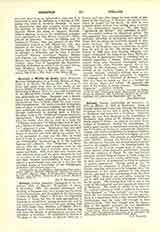

Berlage, ANTON, dogmatic theologian, b. December 21, 1805, at Munster, Westphalia; d. there, December 6, 1881. He studied philosophy and theology in the same city, after completing his course at the Gymnasium, and proceeded to the University of Bonn in 1826. Esser, at Munster, and especially Hermes, at Bonn, led him to such speculations in theology as would have proved detrimental, had he not prosecuted his studies at Tubingen, during 1829 and 1830, under Drey, Hirscher, and Mohler, who influenced him by their historic method, thus saving him from the danger of philosophical systems then prevalent in Germany. He graduated as Doctor of Theology at the University of Munich while yet a deacon, and soon after began his long career as professor in the Academy of Munster, his native town, where he taught till his death. In 1832 he was ordained priest without ever having taken a course in any ecclesiastical seminary. His first book, “Aologetik der Kirche”, was published in 1835, and favorably noticed by Protestant critics. He was appointed, first, associate professor, then regular professor, lecturing on apologetics and moral theology, but he ultimately restricted himself to dogmatic theology. His influence on the theological faculty of the Academy was so marked that its spirit may be said to be his. He became dean of the faculty in 1849 and, with Bisping, Schwane, and others, established the fame of his Alma Mater, excelling less in speculation than in argument and in positive exposition of dogma. Kihn numbers him among those who discussed theological matters philosophically, while Knopfler regards him as belonging to the Tubingen school. Bruck, in his history of the Catholic Church in the nineteenth century, declares, “Berlage’s writings excel in correct expression of dogmatic principles, in elegance of language, and in clearness of diction”. Those who have been his pupils say that as a lecturer he was concise, direct, and refined. He garnered the fruit of his studies in seven volumes, “Katholische Dogmatik”, published 1839-64.
JOS. SELINGER

